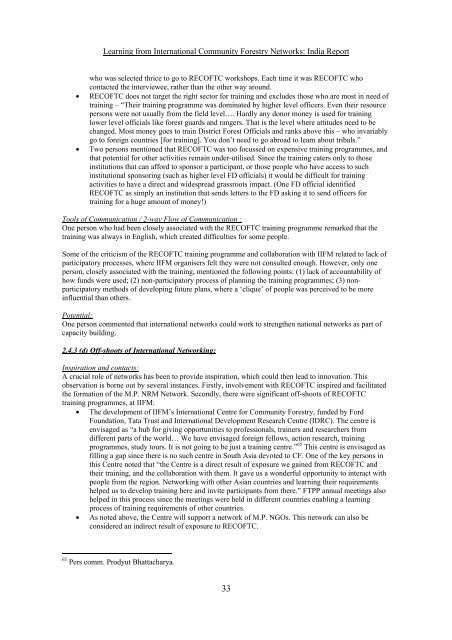Snapshots of International Community Forestry Networks: Country ...
Snapshots of International Community Forestry Networks: Country ...
Snapshots of International Community Forestry Networks: Country ...
Create successful ePaper yourself
Turn your PDF publications into a flip-book with our unique Google optimized e-Paper software.
Learning from <strong>International</strong> <strong>Community</strong> <strong>Forestry</strong> <strong>Networks</strong>: India Report<br />
who was selected thrice to go to RECOFTC workshops. Each time it was RECOFTC who<br />
contacted the interviewee, rather than the other way around.<br />
• RECOFTC does not target the right sector for training and excludes those who are most in need <strong>of</strong><br />
training – “Their training programme was dominated by higher level <strong>of</strong>ficers. Even their resource<br />
persons were not usually from the field level…. Hardly any donor money is used for training<br />
lower level <strong>of</strong>ficials like forest guards and rangers. That is the level where attitudes need to be<br />
changed. Most money goes to train District Forest Officials and ranks above this – who invariably<br />
go to foreign countries [for training]. You don’t need to go abroad to learn about tribals.”<br />
• Two persons mentioned that RECOFTC was too focussed on expensive training programmes, and<br />
that potential for other activities remain under-utilised. Since the training caters only to those<br />
institutions that can afford to sponsor a participant, or those people who have access to such<br />
institutional sponsoring (such as higher level FD <strong>of</strong>ficials) it would be difficult for training<br />
activities to have a direct and widespread grassroots impact. (One FD <strong>of</strong>ficial identified<br />
RECOFTC as simply an institution that sends letters to the FD asking it to send <strong>of</strong>ficers for<br />
training for a huge amount <strong>of</strong> money!)<br />
Tools <strong>of</strong> Communication / 2-way Flow <strong>of</strong> Communication :<br />
One person who had been closely associated with the RECOFTC training programme remarked that the<br />
training was always in English, which created difficulties for some people.<br />
Some <strong>of</strong> the criticism <strong>of</strong> the RECOFTC training programme and collaboration with IIFM related to lack <strong>of</strong><br />
participatory processes, where IIFM organisers felt they were not consulted enough. However, only one<br />
person, closely associated with the training, mentioned the following points: (1) lack <strong>of</strong> accountability <strong>of</strong><br />
how funds were used; (2) non-participatory process <strong>of</strong> planning the training programmes; (3) nonparticipatory<br />
methods <strong>of</strong> developing future plans, where a ‘clique’ <strong>of</strong> people was perceived to be more<br />
influential than others.<br />
Potential:<br />
One person commented that international networks could work to strengthen national networks as part <strong>of</strong><br />
capacity building.<br />
2.4.3 (d) Off-shoots <strong>of</strong> <strong>International</strong> Networking:<br />
Inspiration and contacts:<br />
A crucial role <strong>of</strong> networks has been to provide inspiration, which could then lead to innovation. This<br />
observation is borne out by several instances. Firstly, involvement with RECOFTC inspired and facilitated<br />
the formation <strong>of</strong> the M.P. NRM Network. Secondly, there were significant <strong>of</strong>f-shoots <strong>of</strong> RECOFTC<br />
training programmes, at IIFM:<br />
• The development <strong>of</strong> IIFM’s <strong>International</strong> Centre for <strong>Community</strong> <strong>Forestry</strong>, funded by Ford<br />
Foundation, Tata Trust and <strong>International</strong> Development Research Centre (IDRC). The centre is<br />
envisaged as “a hub for giving opportunities to pr<strong>of</strong>essionals, trainers and researchers from<br />
different parts <strong>of</strong> the world… We have envisaged foreign fellows, action research, training<br />
programmes, study tours. It is not going to be just a training centre.” 65 This centre is envisaged as<br />
filling a gap since there is no such centre in South Asia devoted to CF. One <strong>of</strong> the key persons in<br />
this Centre noted that “the Centre is a direct result <strong>of</strong> exposure we gained from RECOFTC and<br />
their training, and the collaboration with them. It gave us a wonderful opportunity to interact with<br />
people from the region. Networking with other Asian countries and learning their requirements<br />
helped us to develop training here and invite participants from there.” FTPP annual meetings also<br />
helped in this process since the meetings were held in different countries enabling a learning<br />
process <strong>of</strong> training requirements <strong>of</strong> other countries.<br />
• As noted above, the Centre will support a network <strong>of</strong> M.P. NGOs. This network can also be<br />
considered an indirect result <strong>of</strong> exposure to RECOFTC.<br />
65 Pers comm. Prodyut Bhattacharya.<br />
33

















![CynefinFramework final [Read-Only]](https://img.yumpu.com/19017304/1/190x135/cynefinframework-final-read-only.jpg?quality=85)